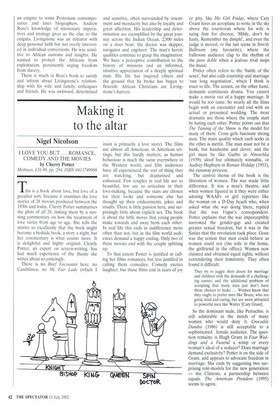Making it to the altar
Nigel Nicolson
I LOVE YOU BUT. .. ROMANCE, COMEDY AND THE MOVIES by Cherry Potter Methuen, .E.16.99, pp. 294, ISBN 0413749908 Th
is is a book about love, but love of a peculiar sort, because it examines the love stories of 28 movies produced between the 1930s and today. Cherry Potter summarises the plots of all 28, linking them by a running commentary on how the treatment of love varies from age to age. She tells the stories so excellently that the book might become a bedside book, a story a night, but her commentary is what counts more. It is delightful and highly original. Clearly Potter, an expert on screen-writing, has had much experience of the theme she writes about so enticingly.
There is no Brief Encounter here, no Casablanca, no My Fair Lady (which I insist is primarily a love story). The films are almost all American, in American settings, but this hardly matters, as human behaviour is much the same everywhere in the Western world, and film audiences have all experienced the sort of thing they are watching, but dramatised and enhanced. Few couples in real life are so beautiful, few are so articulate in their love-making, because the stars are chosen for their looks and someone else has thought up their endearments, jokes and insults. There is little passion here, and surprisingly little about explicit sex. The book is about the little moves that young people make towards and away from each other. In real life this ends in indifference more often than not, but in the film world audiences demand a happy ending. Only two of these movies end with the couple splitting up.
To that extent Potter is justified in calling her films romances, but less justified in calling them comedies. Comedy excites laughter, but these films end in tears of joy or pity, like His Girl Friday, where Cary Grant hires an aeroplane to write in the sky above the courtroom where his wife is suing him for divorce, `Hildy, don't be hasty. Remember my dimple', and even the judge is moved, or the last scene in Strictly Ballroom (my favourite), where the ballroom audience clap to the rhythm of the paso doble when a jealous rival stops the music.
Potter often refers to the 'battle of the sexes', but also calls courtship and marriage 'one long negotiation', which I think is truer to life. The screen, on the other hand, demands continuous drama. You cannot make a movie out of a happy marriage. It would be too tame. So nearly all the films begin with an encounter and end with an actual or presumed wedding. The most dramatic are those where the couple start by hating each other. Potter points out that The Taming of the Shrew is the model for many of them. Cross girls fascinate strong men. The main quality which each seeks in the other is mettle. The man must not be a hunk, but handsome and clever, and the girl must be like Garbo in Ninotchka (1939), aloof but ultimately winnable, or Audrey Hepburn in Roman Holiday (1953), the runaway princess.
The central theme of the book is the liberation of women. The war made little difference. It was a man's theatre, and when women figured in it they were either adoring WAAFs or girl reporters like the woman on a D-Day beach who, when asked what she was doing there, replied that she was Vogue's correspondent. Potter explains that the war imperceptibly narrowed the gender-gap and created greater sexual freedom, but it was in the Sixties that the revolution took place. Gone was the notion that men could behave as women could not (the wife in the home, the girlfriend in the office). Women now claimed and obtained equal rights, without surrendering their femininity. They often found it difficult:
They try to juggle their desire for marriage and children with the demands of a challenging career, and the additional problem of accepting that many men just don't have these choices to make ... Women know that they ought to prefer men like Bruce, who are good, kind and caring, but are more attracted to powerful men like Walter [Cary Grant].
So the dominant male, like Petruchio, is still admirable in the minds of many women who would deny it. Crocodile Dundee (1986) is still acceptable to a sophisticated female audience. The question remains, is Hugh Grant in Four Weddings and a Funeral a wimp or every woman's ideal of a seducer? Does marriage demand exclusivity? Potter is on the side of Grant, and appears to advocate freedom in marriage. She ends by suggesting two surprising role-models for the new generation — the Clintons, a partnership between equals. The American President (1995) seems to agree.


































































 Previous page
Previous page